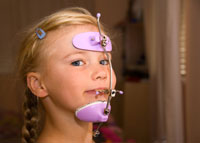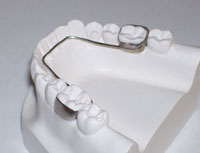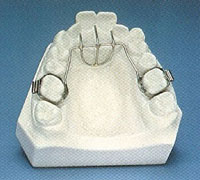Headgear | Fortis | Lower Lingual Arch | Thumb/Finger Appliance | Tongue Thrusting Appliance
Orthodontic Appliances in Erie, PA
When you’re looking for braces or Invisalign in the Erie and Corry, PA areas, Doleski & Wolford Orthodontics strives to be your choice. We’re glad to offer high quality orthodontic treatments for patients of all ages. One of the things that sets us apart is our wide assortment of treatments and techniques. We realize that each patient is unique and has different orthodontic needs, so as your trusted Erie, PA orthodontist, we’re proud to offer a number of orthodontic appliances to treat different orthodontic situations.
Headgear
 Headgear is usually used by our orthodontists to correct an excessive overbite. It works by placing pressure against the upper teeth and jaw to hold the teeth in place or help move them into a better position. Headgear must be worn for a certain amount of time every day. Headgear won’t work to its intended effect if its usage isn’t consistent. The length of time headgear must be worn depends on the severity of the problem it’s correcting.
Headgear is usually used by our orthodontists to correct an excessive overbite. It works by placing pressure against the upper teeth and jaw to hold the teeth in place or help move them into a better position. Headgear must be worn for a certain amount of time every day. Headgear won’t work to its intended effect if its usage isn’t consistent. The length of time headgear must be worn depends on the severity of the problem it’s correcting.
Forsus
This appliance is used on a patient wearing braces and will help push the upper molars back while moving the lower arch forward. The forsus is composed of a spring coil rod that runs from the upper first molar band down to the lower archwire.
Patients who use a forsus may initially feel some discomfort, so Dr. Doleski and Dr. Wolford recommend a soft food diet for the first few days of treatment. If needed, you can use some anti-inflammatory medicine to help ease any pain.
When maintaining your forsus, you should always keep the appliance clean. You can do this by carefully brushing both the coil and the other metal parts of the appliance. It’s also important to note that you shouldn’t open your mouth very wide; doing so can cause the appliance to come apart. If it happens to break, please call our office immediately to schedule an appointment to repair it.
Lower Lingual Arch
 A lower lingual arch is used as a space maintainer to keep molars from drifting forward. This will prevent the molars from blocking spaces where permanent teeth will eventually erupt. The lower lingual arch is commonly used in cases where the baby teeth are prematurely lost or when the lower teeth of a child are slightly crowded. The length of treatment can vary, but it’s usually removed following the eruption of all the permanent teeth.
A lower lingual arch is used as a space maintainer to keep molars from drifting forward. This will prevent the molars from blocking spaces where permanent teeth will eventually erupt. The lower lingual arch is commonly used in cases where the baby teeth are prematurely lost or when the lower teeth of a child are slightly crowded. The length of treatment can vary, but it’s usually removed following the eruption of all the permanent teeth.
There will likely be soreness for the first few days of wearing a lower lingual arch and it may even hurt to chew. Our orthodontists recommend a soft food diet at first, though you’ll want to avoid hard and sticky foods throughout the duration of the treatment. You may take Tylenol or Advil to relieve any pain.
To care for your lower lingual arch, make sure to clean around the bands that are connected to the molars and the wire on the tongue side, in addition to standard brushing and flossing.
Thumb/Finger Appliance
Thumb sucking is a natural reflex in babies and toddlers that gives them comfort. Most children will usually stop sucking their thumbs when their permanent front teeth erupt sometime between the ages of two and four. However, children that don’t stop sucking their thumb after their front teeth have erupted may suffer from misalignment of their teeth and improper growth of their mouth.
One way Dr. Doleski and Dr. Wolford can help stop thumb sucking is by using an appliance known as a fixed palatal crib. This device is placed behind the child’s upper teeth on the roof of the mouth. The fixed palatal crib consists of semicircular stainless steel wires that are fastened to the child’s upper molars using steel bands. This will usually stop thumb sucking within the first day of use.
Tongue Thrusting Appliance
 Tongue thrusting happens when a person presses his or her tongue against the front teeth. This can happen when swallowing, speaking, or even just resting the tongue. Constant tongue thrusting can cause problems with teeth alignment which is why it needs to be curbed.
Tongue thrusting happens when a person presses his or her tongue against the front teeth. This can happen when swallowing, speaking, or even just resting the tongue. Constant tongue thrusting can cause problems with teeth alignment which is why it needs to be curbed.
Orthodontists’ preferred method of fixing this detrimental habit is through the usage of a tongue thrusting appliance. This appliance is similar to a mouth guard and is worn at night. In some cases, a more permanent appliance may be recommended
Contact Your Erie, PA and Corry, PA Orthodontist Today
If you have any questions about orthodontic appliances or if your appliance breaks, please don’t hesitate to
contact us. If you’d like to schedule an appointment, we encourage you to fill out our
appointment request form or give us a call at one of our three convenient locations. We hope to see you soon to provide you with premier orthodontic care!